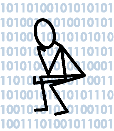
Human-Centered Computing Course
Fall '00, 405 Soda Hall, TuTh 11-12:30pm.
CS 294-4, CCN 26762
 |
Human-Centered Computing CourseFall '00, 405 Soda Hall, TuTh 11-12:30pm.CS 294-4, CCN 26762 |
Instructor: John Canny, 529 Soda Hall, 642-9955, jfc at cs, office hours W-Th 2-3pm
This is a regular 3-unit graduate course. There is also a seminar in human-centered computing this semester. The seminar page is http://www.cs.berkeley.edu/~jfc/hcc/seminar.html
This course adopts a human-centered approach to the design of information systems. Information systems are evolving away from loose collections of applications toward integrated "digital assistants" and "context-aware systems". Those visions of computing assume a high-level understanding of human activity. HCC gathers together knowledge from several fields that lay the groundwork for design goals and principles for future computing systems. The topics presented here were selected because of their importance for the activities that computers mediate today. Several have already led to big ideas in computing: e.g. Mark Weiser's original vision of ubiquitous computing was inspired by the theory of situated activity that we will be discussing. The objective of the course is to give students in computing a broad understanding of human behavior in learning and working (two kinds of knowledge ecology). Ideally, a deep understanding of these topics can lead to new ways of thinking about and integrating computing in human activities.
There is a flip side to including other disciplines, especially social sciences, in HCC. Today, some large-scale systems provide an unprecedented (and perhaps fleeting) opportunity to those disciplines for studies of human behavior. Automated data gathering supports new kinds of study at very large scale or at unusually fine detail. We have such an opportunity in the term projects this semester.
The course contents gives a breakdown of lectures by topic. The topics are:
Classes are held from 11-12:30pm Tuesday and Thursday in 405 Soda. The new format is based on feedback from last year's class. Each class will have:
Once I know the numbers, each enrolled student will get a small wirelessly-networked pen computer to be used for live, collaborative note-taking. The class with experiment with this technology during the semester.
Every enrolled student needs to hand in a list of two or three main points from each reading at the beginning of class.
Projects can be computer programs, designs for information appliances, user studies and analysis, or papers that combine ideas from another discipline with computer science. More information will follow.